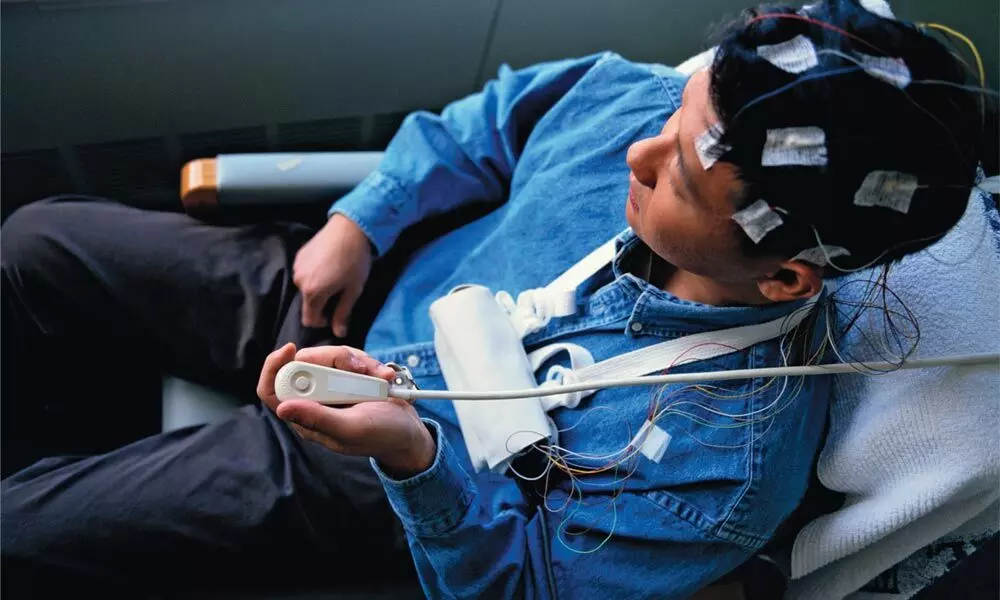'Seizure no mental illness, it's brain disfunction'

‘Seizure no mental illness, it’s brain disfunction’
Every year, November 17 marks the National Epilepsy Day, which is a day to raise awareness among people about the myths and facts around this disease
Every year, November 17 marks the National Epilepsy Day, which is a day to raise awareness among people about the myths and facts around this disease. It is known by different names such as seizure, fits, or convulsions and the like. In many sections of Indian society, epilepsy is also called by the term 'Apasmara'. After migraine, stroke, and Alzheimer's disease, epilepsy is the fourth most widely prevalent disease in India. However, there is still a misconception in the minds of people today about the nature of this illness – unlike what most people believe, epilepsy is not caused by a mental illness, but is caused by neurological dysfunction in the brain. Ahead of National Epilepsy Day, Dr Keni Ravish Rajiv, Consultant, Neurologist and Epileptologist, Aster RV Hospital talks to The Hans India.
Excerpts
What is the difference between seizure and epilepsy?
When there is an abrupt and uncontrollable electrical disturbance in the brain which causes behaviour changes, unexpected body movements or a shift in the person's perception or conscious, this is an episode of seizure. In a person who chronically suffers from such seizures, it is a disorder which is classified as epilepsy.
What are the major types of seizures?
It can be difficult to understand if a person having a seizure. In some cases, the symptoms are very mild, for example they may get a dazed expression or stare blankly into the distance or simply look confused. More severe symptoms are when the patient is unable to stand, starts to shake uncontrollably, falls to the ground and losing sense of what is happening around them.
There are broadly two types of seizures: generalized seizures, or focal seizures. In a generalized seizure, the entire brain is affected whereas in a focal seizure, it is only one part or one area of the brain.
What are the causes of epilepsy?
Certain pre-existing risk factors or conditions which affect the brain can put a person at an increased risk of developing epilepsy. These include stroke, brain infection, brain tumour, a traumatic head or brain injury, cases where there is a lack of oxygen supply to the brain (sometimes happens during birth), issues in brain development or hereditary reasons. In most cases however there is no exact cause of epilepsy. This is called idiopathic or cryptogenic epilepsy.
What are the common triggers for seizures?
Lack of sleep, emotional stress, watching visual flickers, irregular medication are among the common factors that trigger seizures.
What are the myths and beliefs associated with epilepsy?
It was a common belief in the past that a seizure or epileptic attack is caused due to possession by a spirit, or a bad omen, bad karma or a sign of madness. Some pockets of rural India still have the same beliefs. Some people even believe that epilepsy is contagious which adds further to the stigma associated with the disease. Unfortunately, patients who are suffering from epilepsy also have to go through unnecessary discrimination, mental and emotional distress, and loss of equal opportunity at the workplace, educational institutes or other organisations.
What to do when someone gets epileptic attack?
Do not apply force to the patient to stop the convulsions. Turn the patient to one side and wait for it to pass. Ensure that there is sufficient space around the patient. Remove any objects that may cause injury. It is a misconception that you should put something in their mouth, do not do this. Remove any tight jewellery and clothes. If the person has a known history of seizures and has not received expert medical attention yet, take them to the doctor immediately.
What is the general advice given to patients and their care givers?
Get examined by qualified doctors and do required investigations, regularity in medications, regular sleep and timely eating, never stop medications abruptly, always keep medications in excess, do not overprotect the patients but support and encourage when required. You should discourage driving, swimming alone, or handling of machines while on medication. If required, inform the teacher or friends about the seizure and medications. The patients should avoid night shifts in works.
What are the investigations needed for diagnosis of epilepsy?
EEG (electroencephalogram), MRI/CT scan of brain and also additional tests are needed in cases of drug resistant epilepsy including Video EEG, PET scan, SPECT scan, functional MRI, WADA etc.
What are the different types of treatments available?
Medications (more than 20-25 different types of medications), surgical, non-pharmacological (ketogenic diet, vagal nerve stimulation etc) are the types treatment for the disease.
What is epilepsy surgery? When is it recommended?
Drugs are unable to control epilepsy in about 20-30% of the patients. In such patients, most cases there is a visible abnormality on the brain. Therefore, if the surgical abnormality which is visible on the MRI can be removed, then their epilepsy can practically be cured and the quality of life of the patient can be dramatically improved.
Why is epilepsy surgery suggested for patients with intractable seizures?
Suppose the patient's seizures can be controlled with the help of one or two drugs then surgery is not advised. However, in cases where the patient is still suffering from seizures despite being on more than two medications, then surgery becomes a rational and good option for them.
This is because recurrent seizures lead to poor quality of life, injuries, social ostracism, marital issues, care-giver burden, adverse effects of medication and sudden and unexpected death.
Even financially, if you are on two medications, your monthly maintenance comes to around Rs 5000 per month i.e. Rs.60,000 annually. On an average, the cost of epilepsy surgery with all investigations and hospitalisation is close to Rs 2.5 to 3 lakh.
Dr Keni Ravish Rajiv








